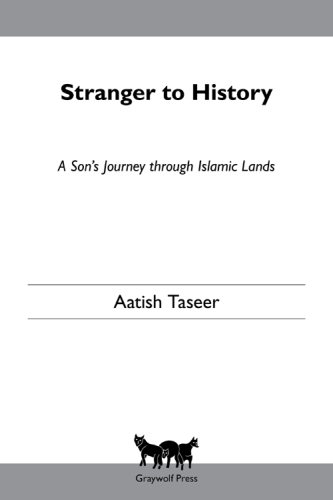
Stranger to History
A Son's Journey through Islamic Lands
- اطلاعات
- نقد و بررسی
- دیدگاه کاربران
نقد و بررسی

July 16, 2012
Compelled to “face and record a suppressed personal history,” Taseer, a former Time magazine reporter and author of two novels (The Temple-Goers and Noon) seeks to put the pieces of his ethnic and spiritual identity together by understanding the bond of his Sikh mother and Pakistani Muslim father and the overarching call of his Islamic faith. Selected portions of his memoir were used to defend the killer of his estranged father, the acting governor of Punjab, for protecting Aasia Bibi, a Christian woman accused of blasphemy for drinking, which transformed the murder trial into a litmus test of his father’s tolerant faith. Taseer launches into a fact-finding quest to uncover his ancestral roots, the holy core of his religion, and what it means to be a Muslim in this century, including dialogues with young radicalized extremists, intellectuals, gays, and traditionalists, stopping in London, Istanbul, Damascus, and Pakistan. The author’s awe of sacred Mecca and prickly spiritual questions about his faith form the spine of this book, along with the political and religious contradictions of Pakistan and the tragic untimely death of Benazir Bhutto.

September 15, 2012
A poignant journey through Muslim lands by a half-Indian, half-Muslim son attempting to find answers to his paternal identity. Journalist and novelist Taseer (Noon, 2011, etc.), raised in Delhi but largely educated in English and American schools, records his eight-month journey to break the "sterile obsessions" with his long-absent father and ascertain for himself what being a Muslim entailed. The product of an affair between a Delhi journalist and a Pakistani politician and disciple of Ali Bhutto, Taseer was raised in Delhi by his mother and Sikh grandparents amid no small confusion about where he fit in. His journalistic trip was an attempt to learn about Islamic traditions and practices and to discover how his own father could consider himself so staunchly Muslim without being in any way religious. Taseer traveled from the extremely secular, in Istanbul, to the extremely pious, in Jeddah, Saudi Arabia, and found Islam served as both a nationality and "brotherhood of man." Interviewing people of varying degrees of faith, he gained the sense that Islam was considered a "world system," with its own rituals and rejection of everything else, namely Christian and Jewish practices, and a conviction that "to be a Muslim is to be above history." Increasingly appalled by the Muslim parochialism he witnessed, Taseer realized the more he learned about Islam, the more his interest in it was "extinguished." In another painful twist, the more he got to know his father, whom he visited in Lahore, the more he recognized a similar narrow-minded focus and indifference to the hard truths of history. A brave, cleareyed look at the contemporary flourishing of Islam.
COPYRIGHT(2012) Kirkus Reviews, ALL RIGHTS RESERVED.

Starred review from September 15, 2012
Journalist and novelist Taseer (Noon) was raised in Delhi by his Sikh mother, and did not know his Pakistani father until he was 21. Father and son struggled with a relationship complicated by their religious and cultural differences. He details his journey through Istanbul, Damascus, Mecca, Iran, and his father's home city of Lahore, Pakistan. Part travel narrative and part memoir, the work provides an insightful look at Islam as a cultural and political force. The years since this book's original publication in 2009 in the United Kingdom have seen many events that changed the work's context: the Green Revolution in Iran, the Arab Spring, and, most heartbreakingly, the political assassination of Taseer's father in 2011. This edition includes a new introduction by the author reflecting on his father's death and the meaning of his book in light of all these events. VERDICT This well-constructed travel memoir offers subtle political insight, well-drawn characters, lush detail, and poignant personal narrative. A welcome blend of journalism, travel writing, and memoir; strongly recommended.--Rachel Bridgewater, Portland Comm. Coll. Lib., OR
Copyright 2012 Library Journal, LLC Used with permission.

October 15, 2012
There are so many layers to this touching book. At its most basic level, it is about the relationship between a father and a son, but it is also about the complex political situation unraveling in Pakistan, and, subsequently, about the irrevocable rift between the same father and son. It is also about the idea of Pakistan, which inevitably means, Taseer explains, its opposition to India. He chronicles a poignant pilgrimage because his account is also about the loss of his father. Salman Taseer, the governor of the province of Punjab, was assassinated by his bodyguard for being an enemy of the Muslim faith. His crime was defending a Christian woman accused of blasphemy. In addition, Stranger to History is a prophetic book. As Taseer recalls his eight-month journey in Pakistan, Turkey, Syria, and Iran, he witnesses intimations of turmoil to come: the anger leading up to the Arab Spring, the faces of the now suppressed Green Revolution following the disputed election of Iranian president Mahmoud Ahmadinejad, and the atrocities of the Assad regime. Moving and exceedingly relevant.(Reprinted with permission of Booklist, copyright 2012, American Library Association.)




دیدگاه کاربران